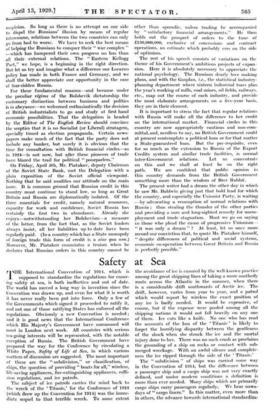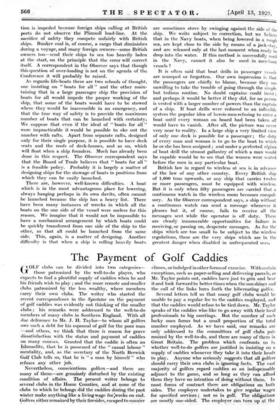Safety at Sea
THE International Convention of 1914, which is supposed to standardize the regulations for ensur- ing safety at sea, is both ineffective and out of date. The world has moved a long way in invention since the Convention was drawn up, and even for what it is worth it has never really been put into force. Only a few of the Governments which signed it proceeded to ratify it, and not one of those ratifying States has enforced all the regulations. Obviously a new Convention is needed ; and it is good news that the International Conference which His Majesty's Government have summoned will meet in London next week. All countries with serious sea-going interests will be represented, with the notable exception of Russia. The British Government have prepared the way for the Conference by Circulating a White Paper, Safety of Life at Sea, in which various matters of discussion are suggested. The most important of these are the " subdivision," or ' classification, of ships, the question of providing "boats for all," wireless, life-saving appliances, fire-extinguishing appliances, colli- sion regulations, and ice patrols.
The subject of ice patrols carries the mind back to the wreck of the ' Titanic,' for the Conference of 1918 (which drew up the Convention for 1914) was the imme- diate sequel to that terrible wreck. To some extent the avoidance of ice is ensured by the well-known practice among the great shipping lines of taking a more southerly route across the Atlantic in the summer, when there is a considerable drift southwards of Arctic ice. The drift, however, varies from year to year, and 'a patrol which would report by wireless the exact position of any ice is badly needed. It would be expensive, of course, but if the expense were pooled among all the shipping nations it would not fall heavily on any one of them. Ice cuts like a knife. No one who has read the accounts of the loss of the ' Titanic ' is likely to forget the horrifying disparity between 'the gentleness of the shock when she struck the ice and the mortal injury done to her. There was no such crash as proclaims the grounding of a ship on rocks or contact with sub- merged wreckage. With an awful silence and complete- ness the ice ripped through the side of the ' Titanic.'
The " subdivision " of ships was carried some way in the Convention of 1914, but the difference between a passenger ship and a cargo ship was not very exactly defined, and under modern conditions a definition is more than ever needed. Many ships which are primarily cargo ships carry passengers regularly. We hear nowa- days of " cargo liners." In this matter, even more than in others, the advance towards international standardiza- Lion is impeded because foreign ships calling at British ports do not observe the Plimsoll load-line. At the sacrifice of safety they compete unfairly with British ships. Bnnker coal is, of course, a cargo that diminishes during a voyage, and many foreign owners—some British owners too—send their ships to sea too heavily laden at the start, on the principle that the error will correct itself. A correspondent in the Observer says that though this question of over-loading is not on the agenda of the Conference it will probably be raised. • As regards life-boats there are two schools of thought, one insisting on " boats for all " and the other main- taining that in a large passenger ship the provision of boats for all would impede the proper working of the ship, that some of the boats would have to be stowed where they would be inaccessible in an emergency, and that the true way of safety is to provide the maximum number of boats that can be launched with certainty. We suppose that even if the ideal of " boats for all " were impracticable it would be possible to eke out the number with rafts. Apart from separate rafts, designed only for their single purpose, it is possible to have deck seats and the roofs of deck-houses, and so on, which will float when a ship founders. Much has already been done in this respect. The Observer correspondent says that the Board of Trade believes that " boats for all " is a feasible policy. Probably it is largely a matter of designing ships for the stowage of boats in positions from which they can be easily launched.
There are, however, well-known difficulties. A boat which is in the most advantageous place for lowering, always hanging perhaps in its own davits, often cannot be launched because the ship has a heavy list. There have been many instances of wrecks in which all the boats on the one side of the vessel were useless for this reason. We imagine that it would not be impossible to have a mechanical arrangement by which boats could be quickly transferred from one side of the ship to the other, so that all could be launched from the same side. This, again, is a matter of designing. Another difficulty is that when a ship is rolling heavily boats are sometimes stove by swinging against the side of the ship. , We write subject to correction, but we haeve that in the Navy boats, when being .lowered in a rough sea, are kept close to the side by means of a jack-stay, and are released only at the last moment when ready to drop into the water. If this method is successfully used in the Navy, cannot it also be used in merchant vessels ?
It is often said that boat drills in passenger vessels are scamped or forgotten. Our own impression is that the passengers are chiefly to blame, because they arc unwilling to take the trouble of going through the simple but tedious routine. No doubt captains could insist; and perhaps it would be better if they did, for no person is vested with a larger number of powers than the captain of a ship. If boat drills were reduced to an inflexible system the popular idea of heroic men refusing to enter a boat until every woman on board had been taken off would have to vanish. After all, the picture was never very near to reality. In a large ship a very limited view of only one deck is possible for a passenger ; the duty of every man and woman is to go to the boat to which he or she has been assigned ; and under a perfected regime of boat drill the utmost gallantry of which a man would be capable would be to see that the women were seated before the men in any particular boat.
British law in regard to wireless at sea, is in advance of the law of any other country. Every British ship of 1,600 tons upwards, or any ship that carries twelve or more passengers, must be equipped with wireless. But it is only when fifty passengers are carried that a continuous watch in the wireless room becomes compul- sory. As the Observer correspondent. says, a ship.without a continuous watch can send a message whenever it pleases but it, of course, . fails to receive all the messages sent while the operator is off, duty. There are clearly innumerable opportunities for failure in receiving, or passing on, desperate messages. As for the ships which are too small to be subject to the wireless regulations, these are the very ships which are in the greatest danger when disabled in unfrequented seas.



















































 Previous page
Previous page